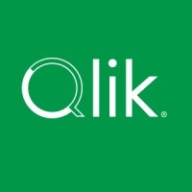
![Talend Open Studio [EOL] Logo](https://images.peerspot.com/image/upload/c_scale,dpr_3.0,f_auto,q_100,w_64/bceq7xfg24vcset503xm0hyyr88r.jpg?_a=BACAGSGT)
Qlik Replicate and Talend Open Studio compete in data integration. Qlik Replicate holds an edge with its real-time capabilities, while Talend Open Studio offers strong community support and customization options.
Features: Qlik Replicate is known for its real-time change data capture, automatic replication, and broad compatibility across databases. Talend Open Studio features over 900 connectors, a drag-and-drop interface, and extensive customization capabilities, making it suitable for complex ETL tasks.
Room for Improvement: Qlik Replicate could benefit from more intuitive error insights, enhanced integration with third-party apps, and streamlined licensing. Talend Open Studio needs better performance in continuous data replication, improved error tracking, and a more intuitive user interface.
Ease of Deployment and Customer Service: Qlik Replicate supports deployment across public, private, and hybrid clouds, but users face connectivity issues and slow support response. Talend Open Studio primarily operates on-premises, is easy to deploy, but lacks in quick support, requiring technical expertise.
Pricing and ROI: Qlik Replicate is considered expensive for small businesses, yet offers ROI through improved analytics efficiency. Talend Open Studio's free version is cost-effective for smaller enterprises, with its licensed version providing advanced features, offering ROI through customization and integration support.
I conducted a cost comparison with the AWS service provider, and this option is much cheaper than the Kinesis service offered by AWS.
Customers have seen ROI with Qlik Replicate because they get their data for analysis faster, enabling quicker decision-making compared to traditional data sourcing methods.
Even priority tickets, which should be resolved in minutes, can take days.
Support response times could be improved as there are sometimes delays in receiving replies to support cases.
The system could be scaled to include more sources and functions.
It is a core-based licensing, which, especially in the banking industry, results in the system capacity being utilized up to a maximum of 60%.
Qlik Replicate could be improved in the next release by incorporating more monitoring options to monitor the logs.
If we could have round-the-clock support, we would be able to resolve many issues which we encounter during the development part.
For Qlik Replicate, the setup cost includes the requirement of a server, which represents the hardware cost that must be covered.
Licensing is calculated based on the machine's total capacity rather than actual usage.
The most valuable feature of Qlik Replicate is their change data capture feature.
Data retrieved from the system can be pushed to multiple places, supporting various divisions such as marketing, loans, and others.
It also comes with a console which helps us to monitor the jobs we have built in, making that monitoring part easy.

| Company Size | Count |
|---|---|
| Small Business | 9 |
| Large Enterprise | 11 |
| Company Size | Count |
|---|---|
| Small Business | 22 |
| Midsize Enterprise | 13 |
| Large Enterprise | 18 |
Qlik Replicate is a data replication solution for replicating data from one source database to another for business intelligence software. It offers data manipulation and transformations, replication without impacting source databases, and ease of use without needing ETL. The solution is stable and user-friendly, with detailed logging and support.
Qlik Replicate has improved the organization by allowing each team to replicate their data into a single-source data location. The most important feature of Qlik Replicate is its ability to replicate and update records without needing a programmer.
Talend Open Studio [EOL] is a user-friendly data integration tool that offers comprehensive ETL capabilities with extensive connector options. Its open-source nature and integration with a range of data sources make it a versatile choice for data integration tasks.
Talend Open Studio [EOL] provides flexibility and scalability for data integration by supporting relational and NoSQL databases. It is Java-based, allowing customization and data quality features, backed by community support. Challenges include limitations in scheduling and monitoring, technical support, resource consumption, and version control. The complex installation process and need for better documentation and easier use for beginners are notable issues. Despite these, it remains a strong option for connecting legacy applications, building data warehouses, and automating processes with data migration, synchronization, transformation, and loading from ERP systems, APIs, and databases like PostgreSQL, Oracle, and SQL Server.
What are the standout features of Talend Open Studio [EOL]?Talend Open Studio [EOL] is implemented across sectors like telecom, finance, and real estate for managing data flows, constructing information hubs, and enhancing business intelligence. Companies utilize it for data migration, synchronization, and transformation, ensuring efficient data integration in diverse applications.
We monitor all Data Integration reviews to prevent fraudulent reviews and keep review quality high. We do not post reviews by company employees or direct competitors. We validate each review for authenticity via cross-reference with LinkedIn, and personal follow-up with the reviewer when necessary.